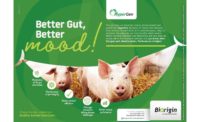Cargill explores impact of mycotoxin contamination on poultry gut health
Cargill Animal Nutrition & Health presents new research at the World Mycotoxin Forum.

Cargill Animal Nutrition & Health is presenting new research at the World Mycotoxin Forum, April 7-9, 2025, offering insights into global mycotoxin contamination trends and their impact on poultry gut health.
Conducted by Cargill Micronutrition & Health Solutions, the research utilizes a large mycotoxin database, built on over 400,000 analyses across more than 150 feed plants, farms and storage locations worldwide. This data enables real-time tracking of contamination risks and helps feed producers make informed sourcing and quality control decisions.
The large size of the database allows for regional insights. Mycotoxin levels vary significantly by geography and time, making a broad dataset essential for accurate risk assessment and proactive management.
“Healthy animals perform better, and feed safety is a crucial part of optimizing livestock productivity,” said Clément Soulet, category lead – Cargill Micronutrition & Health Solutions. “This database provides producers with real-time, location-specific risk insights, helping them make proactive decisions to protect their animals and their bottom line.”
A second study investigates the impact of deoxynivalenol on broiler gut microbiota and finds that deoxynivalenol-contaminated feed disrupts the natural development of beneficial bacteria, while promoting the persistence of harmful pathogens such as Campylobacter and Salmonella.
The research also tested an anti-mycotoxin agent, which counteracted deoxynivalenol's negative effects, supporting healthy microbiota maturation.
In addition to these research findings, Cargill Animal Nutrition & Health will present its new Notox brand at the World Mycotoxin Forum. The new brand will focus on advanced mycotoxin risk management.
Source: Cargill
Looking for a reprint of this article?
From high-res PDFs to custom plaques, order your copy today!




